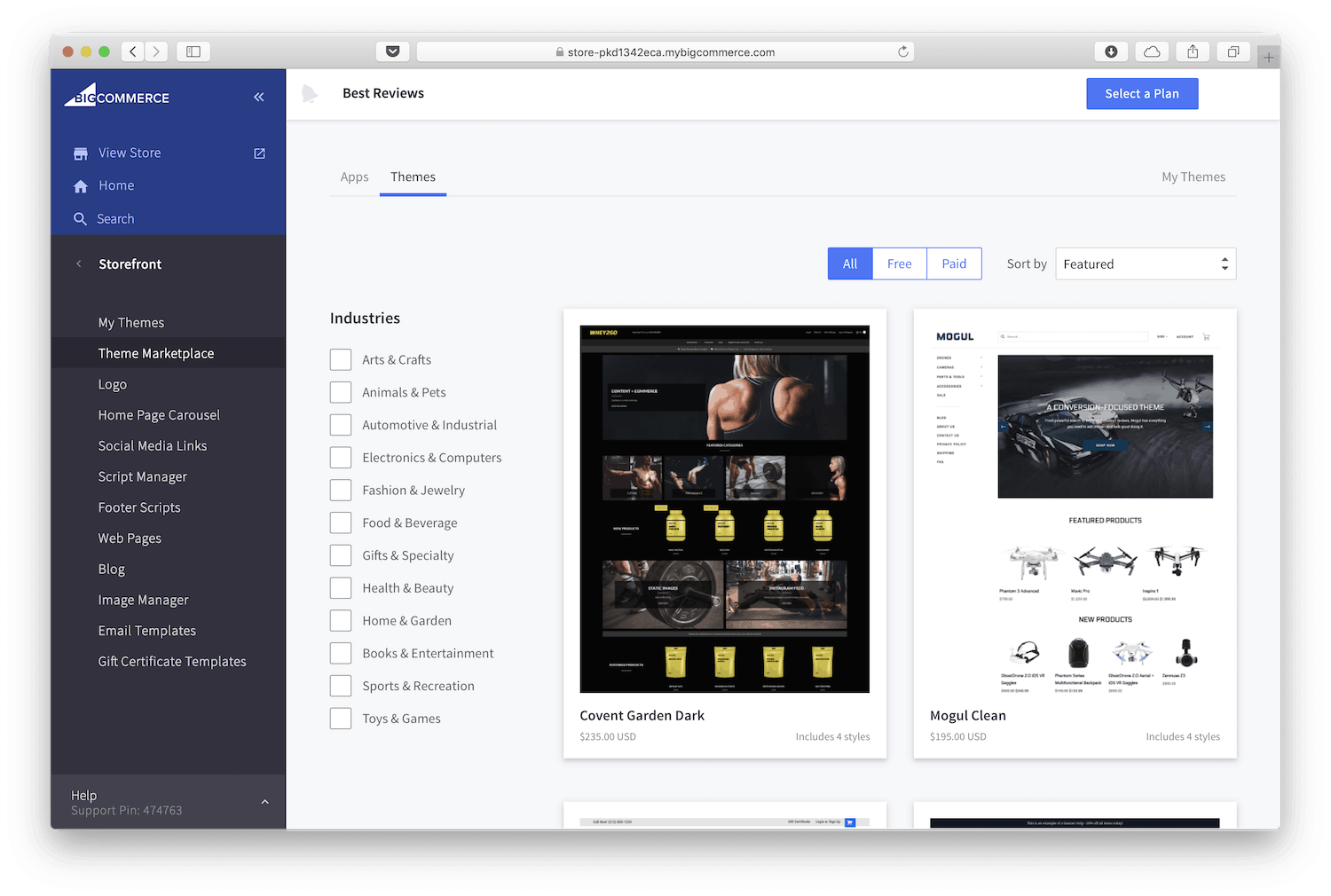BigCommerce Reviews
Pros
-
Comprehensive set of tools ‘out of the box'
-
Multichannel integration, including social media
-
Addition of advanced tools with apps
-
Easy-to-use interface
-
Detailed guides
Cons
-
Only seven free templates
-
Custom SSL certificates supported only on higher-pricing tiers
There are some instances where size really does matter. When an ecommerce platform covers 120 countries and has more than 500 employees behind it, that’s when size matters. BigCommerce started as a two-person startup, but has rapidly grown into a vibrant ecommerce platform as a service; a true success story born from the company’s clever decision to tap into a segment of ecommerce services that remains fairly unexplored by competitors. BigCommerce offers the most comprehensive tools and services to customers looking to move their store from offline to online for a starting price of $29.95 per month, which mostly matches competitors offering lesser services. Those eyeing this versatile platform can sign up for a 15-day trial period, during which they can test all the features to help make a decision.
Best ecommerce platforms of 2025
Clean, easy-to-use interface
1,000+ apps to choose from
Comprehensive set of design tools
Easy-to-understand user interface
Great customization options
Comprehensive set of tools
100+ payment gateways supported
The most free themes to choose from in the industry
Features
A BigCommerce account is actually the door to a world of everything ecommerce, with one important goal: to get the store that you envisioned online. This includes services ranging from design through to recurring payments and shipping, with a variety of options suited to different budgets. Users will initially be greeted by the dashboard where they will find detailed guidance on the steps required to get the store up and running, and the necessary tools are just a click away, all packed into an easy-to-use interface with a modern design.
What makes BigCommerce unique in its field is that it has answers to every question that store owners may have. If it doesn’t, it has an established network of certified professionals and can put you in touch with them to find a solution to any problem or challenge.
Design
It’s easier on the budget to pick one of the seven free themes from BigCommerce’s marketplace, but there are also 121 beautiful paid themes ranging from $145 to $245, which are worth considering. Every aspect of the theme starting with the carousel through to the “About us” page is ready for personalization the moment a theme is installed. There is no component that cannot be customized, while the preview feature displays the store as it will be seen on mobile devices. This is something that anyone with the tiniest understanding of HTML can deal with, though in this regard it’s worth noting that BigCommerce doesn’t offer support for modified templates and so a deep knowledge of web code is necessary.
BigCommerce supports physical and digital products by default. The available tools allow for unlimited product creation options, covering price, weight, and inventory levels and can set rules – such as adding extra costs for larger products – that are organized into well-defined, easily managed customer categories. While it is possible to sell subscriptions via BigCommerce, the default toolset only allows downloadable products and not services with recurring payments, which are enabled with respective apps from the marketplace.
BigCommerce’s attention to detail also applies to the product upload section, which has a great number of fields to be filled with information to emphasize the unique features of the product and optimize the page for SEO purposes.
Design
| Free templates | 7 |
|---|
| Mobile ready | |
|---|
| Customize checkout | |
|---|
| Customizable themes | |
|---|
Business options
Business options
| Multichannel integration | |
|---|
| Inventory | |
|---|
| Transaction fee | |
|---|
| Abandoned cart recovery | |
|---|
| Promotions | |
|---|
| Blogging platform | |
|---|
| Domain name | |
|---|
| Reporting tools | |
|---|
| Sales tickets | |
|---|
| HTTPS | |
|---|
| Secure checkout | |
|---|
| Unlimited file storage | |
|---|
| Navigation link | |
|---|
| Page titles | |
|---|
Show all
While its competitors mostly rely on online payment methods, BigCommerce’s comprehensive toolset also includes offline payment methods, so there’s no chance that store owners will miss a sale because they cannot provide the customer’s preferred way of paying. The company’s attention to detail applies to the shipping options available, too, although installation of additional apps is a requirement for a better customer experience (more on that a bit later).
The good thing about all-in-one solutions such as BigCommerce’s is that they allow sellers to think big. For example, if a retailer decides to open an online store, the service makes it possible to sell products across all existing channels including Amazon, eBay, and social-media marketplaces. A separate account is necessary for any of these sales platforms, but the value of managing all these different sales channels – and their taxes – from one dashboard is priceless.
And considering the wide range of marketing tools available, BigCommerce customers have a powerhouse ready to go wild with their store; if used properly it will likely generate growth, too. For example, your customers can be reviewed and eventually you’ll be able to reward the top users. Also, thanks to the various apps and integrations, store owners can quickly view the status of orders and shipments or customize the checkout by adding the store’s logo, changing colors, fonts, and more.
Utilities
Utilities
| # payment processors | 39 |
|---|
| Custom url | |
|---|
| Meta description | |
|---|
If there is a feature that BigCommerce doesn’t offer in its basic toolset, then you’ll find it in the marketplace. By collating apps into categories such as must-haves, shipping essentials and more, BigCommerce speeds up the selection process. All apps serve to extend your store’s capabilities and automate processes such as shipping, order status, and accounting. Those intending to sell subscriptions will need to visit the marketplace, too, and will again be met by the generosity of the platform, which has at least three options to install to get started. The prices of these apps range from free to an upfront $500 fee, so in such cases it helps to have a look at the ratings of the apps or by using the filters to search for something specific.
If the one-click integrations listed in the marketplace aren’t enough, users can build new functionalities and integrations into their store by using BigCommerce’s open API architecture with unlimited calls. Meanwhile, secure pages are automatically served over HTTPS when using the BigCommerce shared SSL certificate, but to host your entire site on a secure connection you must install a dedicated SSL certificate.
Pricing
BigCommerce encourages users to sell through their own domains, but support for the installation of a custom SSL certificate is only available for the higher-paying Pro and Enterprise plans. Similar limitations apply to other features as well, with the threshold for the pricing plans defined by annual sales in dollars.
For $29.95 per month users get a standard plan with zero transaction fees and unlimited file storage and bandwidth, but in order to get access to customer group segmentation it is necessary to upgrade to the Plus plan, costing $79.95 per month. This also enables a higher amount of online sales per year – up to $150k – but should the store grow beyond this then users will be upgraded to the $249.95 per month Pro plan. The fourth plan targets enterprise customers and is fully customizable in its pricing and gives access to all of the features offered by BigCommerce. The company accepts PayPal and all major credit cards to pay for the service.
Standard
$29.95/mo
Billed monthly
Up to $50k online sales per year
Unlimited staff account
Unlimited products
Professional reporting tools
Free sitewide HTTPs and dedicated SSL
–
–
–
–
–
Plus
$79.95/mo
Billed monthly
Up to $150k online sales per year
Unlimited staff account
Unlimited products
Professional reporting tools
Free sitewide HTTPs and dedicated SSL
Customer groups and segmentation
Abandoned cart saver
Stored credit cards
–
–
Pro
$249.95/mo
Billed monthly
Up to $400k online sales per year
Unlimited staff account
Unlimited products
Professional reporting tools
Free sitewide HTTPs and dedicated SSL
Customer groups and segmentation
Abandoned cart saver
Stored credit cards
Google customer reviews
Custom SSL
It’s important to note that as you move up in the pricing tiers, PayPal’s cut from payment processing decreases from 2.9% + $0.30 per transaction to 2.2% + $0.30 or lower per transaction. Other payment processors have different rates, so check those before selecting the default gateway. Users have 15 days to do so, with the trial period that allows for a comprehensive test of the platform.
Payment options
|
Visa
|
|
|
Mastercard
|
|
|
American Express
|
|
|
Discover
|
|
|
PayPal
|
|
|
Wire transfer
|
|
|
Check
|
|
|
Cryptocurrency
|
|
Show all
Customer service
Customer support
|
24/7
|
|
|
Live chat
|
|
|
Email
|
|
|
Phone
|
|
|
Community
|
|
|
FAQs
|
|
|
Video tutorials
|
|
|
Remote desktop
|
|
|
Blog
|
|
|
Facebook
|
|
|
Instagram
|
|
|
X
|
|
|
YouTube
|
|
Show all
Every BigCommerce client has access to one of the best customer support services that we have experienced so far. Alongside the helpful guides that BigCommerce has in place to help you set the store up, a help center includes an in-depth video series guiding users through the process and detailed tutorials and articles to answer any questions.
Nor is it a problem if your question isn’t answered here, since users can ask the community of BigCommerce users, email the company’s support, talk with an agent via live chat, or call support directly. The best thing about it is that customer support is available 24/7, so it doesn’t really matter which time zone you are in or what part of the day you encounter the issue; just select the preferred communication channel and your answer should be forthcoming.
Bottom line
If you are looking for an all-in-one ecommerce platform, then BigCommerce is one of the best options for your money. Not only does it offer a comprehensive set of tools out of the box for every aspect of the store – covering everything from integration and customer retention to newsletters, coupons, and campaign promotion – but it also has a marketplace with apps that can help automate processes and expand the platform’s capabilities. This means you’ll have access to more advanced tools such as recurring billing and carrier services, created by third-party developers and approved by BigCommerce.
Why you can trust us
The Best Reviews team researches and tests all products first-hand. We've been reviewing products
and services since 2012 and are proud to only publish human-created content.






























User reviews